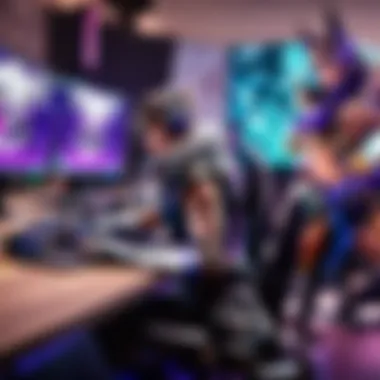GCU Esports: A Comprehensive Overview of the Program


Intro
Grand Canyon University (GCU) has carved a distinct niche within the esports landscape. As collegiate esports continues to expand, institutional programs like GCU's play a vital role. Their approach to esports covers various dimensions: competitive play, student engagement, and community outreach. This article begins by examining GCU's structure, detailing how it fosters talent among its students.
Esports at GCU doesn't merely function as an athletic endeavor. It intertwines education, promoting skills through gameplay that align with career aspirations. With a commitment to creating a thriving community, GCU's program actively engages students, faculty, and the broader public.
Breaking down the components of GCU Esports, this article will address
- The program's developmental background.
- The variety of games available for competition.
- Strategic partnerships that enhance the overall esports ecosystem.
- The significance of community engagement and educational influence.
This combination of factors positions GCU as an influential player within collegiate esports, setting standards for others to aspire to.
The Evolution of Esports
The evolution of esports is not merely a chronicle of competitive gaming; it encapsulates a significant shift within the cultural, social, and economic fabric of our society. This evolution informs the development and structure seen at institutions like Grand Canyon University, where students engage not only in gameplay but also in strategic thinking, teamwork, and digital innovation. Understanding this evolution serves as a foundation for exploring how GCU is impacting collegiate esports and shaping future gaming cultures.
Defining Esports
Esports, or electronic sports, is defined as organized, multiplayer video game competitions often between professional players, individually or as teams. Unlike traditional sports, esports differs in its medium of competition, where players compete in games like League of Legends, Dota 2, Counter-Strike, and others. This distinct format presents a unique landscape that continues to grow. The core of esports revolves around not just skill and strategy, but also audience engagement, with many tournaments attracting millions of viewers worldwide.
The Growth of Collegiate Esports
The surge in collegiate esports can be traced back to several pivotal developments. First, the increased accessibility of streaming platforms has allowed institutions to showcase their teams, drawing attention from potential sponsors, players, and fans. Additionally, universities have recognized the potential for esports to foster community and school spirit, similar to traditional athletics.
Key elements in the growth of collegiate esports include:
- Increased Participation: More institutions are forming teams, encouraging student engagement and enhancing competitive opportunities.
- Scholarship Programs: Many colleges offer scholarships for esports athletes, leading to greater institutional support.
- Organized Events: Tournaments are increasingly common, not only providing a platform for competition but also enhancing exposure for schools and their players.
Esports clearly serves as a conduit for teamwork, strategy, and personal growth among participants. As the framework continues to evolve, the impact on organizations like GCU becomes more prominent, outlining future prospects for both players and educational institutions.
Foreword to GCU Esports
The significance of GCU Esports lies in its ability to merge the dynamic world of competitive gaming with the educational environment of Grand Canyon University. This combination fosters an ecosystem that not only promotes athletic prowess but also emphasizes academic and personal growth among its participants. Through the GCU esports program, students can engage in an area that aligns with their interests while gaining valuable skills that are applicable both in gaming and in various career fields.
The rise of esports as a legitimate domain of competition has prompted institutions like GCU to embrace this trend. As a result, GCU Esports becomes more than just a club; it evolves into a thriving program that supplies essential resources, guidance, and structure. This section will delve into GCU Esports' rich history and aspirations, which are pivotal for understanding its current stature and future directions.
History of GCU Esports
GCU Esports began as a small initiative aimed at providing students with a platform to connect over video games. Initially, it attracted a modest number of participants who engaged in casual gaming. Over time, interest surged, prompting the university to recognize the potential for a more structured program. This led to the establishment of competitive teams and the introduction of various esports titles.
As the program matured, GCU Esports started participating in regional and national tournaments, which enhanced its visibility. The history of GCU Esports is marked by significant milestones, ranging from the formation of the first team to partnerships with notable organizations in the esports industry. This evolutionary process set the groundwork for a program that today embodies dedication and excellence in collegiate gaming.
Goals and Objectives
The goals and objectives of GCU Esports are multi-faceted, reflecting the diverse interests of its members. At its core, GCU Esports aims to foster a competitive yet supportive environment where students can elevate their skills across various games. This includes enhancing teamwork, strategic thinking, and individual performance.
In addition to competitive aspirations, the program emphasizes the importance of community. GCU Esports seeks to create connections not only within the university but also with local and national gaming communities. This encourages a spirit of collaboration and inclusivity.
Here are some key goals:
- Develop competitive teams: Facilitating the formation of skilled teams to represent GCU in major tournaments.
- Promote personal growth: Encouraging students to develop soft skills such as leadership, communication, and resilience.
- Encourage community involvement: Engaging with local schools and organizations to spread awareness of esports and its benefits.
Overall, GCU Esports is committed to enhancing the academic experience of its students while contributing positively to the growing field of esports.


Organizational Structure
The organizational structure of GCU Esports serves as the backbone for its operations and growth. This framework determines how various components of the program interact and function, playing a key role in fostering a productive environment for competitive gaming and educational advancement. A well-defined organizational structure ensures efficient decision-making processes, clear delineations of responsibilities, and promotes collaboration across different levels of the esports program. It supports both strategic planning and operational execution, creating a pathway for future success and sustainability.
Administrative Oversight
At GCU Esports, the administrative oversight plays a crucial role in maintaining the integrity and direction of the program. This layer of management includes leadership figures who set the policies and goals for the esports teams. The administration is responsible for ensuring that the program aligns with the university’s broader mission and values.
Specific duties include budgeting, resource allocation, and navigating relationships with sponsors. The administrators also cultivate a culture of accountability, ensuring that teams adhere to rules and standards. Moreover, they provide oversight during competitions, ensuring the ethics of play and fairness. This supervisory approach is important for both the students and the university, as it supports sustainable growth and enhances the reputation of GCU in the esports landscape.
Coaching and Support Staff
The coaching and support staff provide expertise and guidance that are essential to the success of GCU’s esports teams. Coaches are not only instructors in gameplay mechanics but also mentors who develop players' strategic and analytical skills. They craft training regimens, analyze opponents, and focus on team dynamics. Their efforts directly contribute to the competitive edge of the teams.
Support staff also play a major role. This team often includes analysts, psychologists, and technical support personnel. Analysts help dissect gameplay data for training purposes. Psychologists work on the mental fortitude of the players, which is especially important in high-stress competition. Technical support ensures that the teams have access to the best possible gaming setups, maintaining equipment and connectivity standards.
Student Involvement and Leadership
Student involvement is a vital aspect of GCU Esports, adding a layer of engagement that shapes the overall experience. Many teams encourage student leadership roles, fostering a sense of ownership among players. Student leaders often facilitate practices, organize events, and serve as liaisons between the teams and administration.
These leadership opportunities are a means for students to develop essential skills that extend beyond gaming. They learn about event management, conflict resolution, and team organization. Moreover, fostering a strong student-led initiative helps build a community that is resilient and capable of navigating the challenges of competitive esports.
The engagement of students in various roles and their input in decision-making processes not only empowers them but also enhances the inclusivity of the program. This involvement directly contributes to a thriving esports culture within the university.
Competitive Teams at GCU
GCU Esports has strategically positioned itself to be a competitive force in the collegiate gaming arena. The establishment of well-structured teams not only instills a sense of community among students but also enhances the university's reputation in the esports domain. Additionally, the competitive teams at GCU aim to cultivate essential skills among participants. These include teamwork, communication, and strategic thinking, which are invaluable in both gaming and broader professional contexts.
Overview of Games Offered
GCU Esports takes a diverse approach to its competitive offerings, featuring a variety of games that cater to different interests and skill sets. The program engages students through popular titles such as League of Legends, Overwatch, and Valorant. Each game represents a unique competitive landscape, encouraging players to excel in specific mechanics and strategies.
By providing opportunities across these genres, GCU promotes inclusivity among gamers, enhancing overall participation in the program. The emphasis on team-based games fosters collaboration and healthy competition, both of which are critical to players' development.
Major Achievements
The achievements of GCU Esports are a testament to the hard work and dedication of its players and coaching staff.
"Success in collegiate esports not only builds confidence but also inspires future generations of gamers."
- In recent years, GCU has made significant strides in various national competitions, often placing in the top ranks. This includes notable performances in tournaments hosted by the National Association of Collegiate Esports and other prestigious events.
- The success of GCU's teams has garnered attention from sponsors, which in turn enhances funding and resources available for athletes. This relationship underscores the potential for esports to attract serious investment and support.
Moreover, by excelling in competitions, GCU reinforces its commitment to not just play but to thrive within the esports landscape. As the program continues to evolve, these accomplishments attract more players, diversifying the talent pool and expanding the program's reach. The combination of solid game offerings and significant achievements plays a crucial role in ensuring the program's lasting impact in the collegiate esports community.
Partnership and Sponsorship Opportunities
Partnerships and sponsorships play a crucial role in the development and success of the GCU esports program. These opportunities provide financial support and resources necessary for the growth of the program. Sponsorship agreements can enhance the visibility of GCU’s esports initiative and generate significant interest from both the local community and the broader gaming industry. This interplay between the university and commercial entities not only bolsters the program but also enriches the educational and competitive experiences for the students.
Local and National Sponsors
GCU Esports has engaged with both local and national sponsors to create a robust support system for its teams. The local sponsors are often businesses within the Phoenix area that target the university student demographic. These partnerships allow for mutual benefits, where local companies gain visibility among students while the esports program receives funding and resources. National sponsors bring a different dimension with broader reach and often provide more substantial financial support.
Some examples of potential sponsors include gaming hardware companies like Razer and Logitech and software companies such as Blizzard Entertainment. Their involvement can also offer discounts or access to professional-grade equipment, enhancing the competitive edge of GCU teams.


Sponsorship deals often entail co-hosted events and branding opportunities at tournaments and matches. This arrangement helps elevate the sponsors’ brand visibility and aligns them with the high-energy world of esports, attracting a youthful audience.
Impact on the Program's Growth
The presence of sponsors fosters an environment conducive to growth and innovation. Financial backing enables GCU Esports to enhance its facilities, host larger tournaments, and provide better training for its athletes. This investment leads to improved performance, which, in return, attracts more sponsorships—a positive feedback loop.
Moreover, the program can allocate more scholarships to talented players, making GCU an appealing choice for prospective students interested in pursuing a career in esports or related fields. Additionally, these sponsorships broaden networking opportunities for students, linking them with professionals in the industry and potentially opening doors for internships or employment.
"Sponsorships are more than just financial support; they are bridges to opportunity and professional growth for our students."
By engaging with the community and national brands, GCU Esports solidifies its position within the rapidly growing industry of competitive gaming. It creates a sustainable ecosystem that nurtures talent and promotes collegiate esports as a viable career pathway.
Community Engagement
Engaging with the community is not merely an adjunct to the GCU Esports program; it is a cornerstone that fosters relationships and opportunities. Effective community engagement strengthens the ties between the university and its local environment, creating a network that benefits everyone involved. Through this engagement, GCU Esports enhances its visibility and prominence within the collegiate esports arena. Programs focused on outreach allow students to connect with younger audiences, showcasing the potential of esports as a career path. Additionally, community initiatives enrich the GCU experience for both students and local participants, fostering a culture of inclusion and teamwork.
Involvement with Local Schools
GCU Esports regularly collaborates with local schools to promote gaming and its educational benefits. These partnerships often take shape through workshops and tournaments, where students from nearby high schools can experience the competitive landscape of esports. By providing hands-on training and mentorship, GCU helps cultivate the next generation of talent.
Such initiatives often include:
- Esports Clinics: These clinics provide practical skills in game mechanics and teamwork. Coaches guide participants through strategic gameplay, improving their understanding of various competitive titles.
- Mentorship Programs: GCU students serve as mentors, offering advice and support. This interaction can inspire younger gamers to pursue their passions seriously.
- Scholarship Opportunities: Involvement with local schools can create pathways for students to receive scholarships, highlighting GCU's commitment to nurturing talent.
Through these actions, GCU Esports not only promotes its own program but also raises awareness of esports as a legitimate career field. This connection helps dispel myths surrounding gaming while making it accessible and appealing to a broader audience.
Events and Collaborations
Organizing events is a strategic approach that GCU Esports utilizes for deeper community ties and enhanced visibility. These engagements can take various forms, including tournaments, exhibitions, or charity events. Each of these fosters goodwill and supports local causes.
Notable events include:
- Annual Tournaments: GCU Esports hosts competitions that invite participation from a variety of institutions. These tournaments encourage rivalry and camaraderie, proving to be both entertaining and educational.
- Game Nights: These informal gatherings create a relaxed environment where students and local players can enjoy gaming together. This also provides opportunities for networking and making new friends.
- Charity Streams: Collaborations with nonprofits involve livestreaming charity events. Participation in these streams raises funds for various causes while showcasing the potential for gaming to make a difference.
The Role of GCU Esports in Education
Esports is becoming an integral part of education, especially at colleges like Grand Canyon University. GCU Esports provides unique opportunities for students. It creates a learning environment that fosters not just gaming skills but also the essential soft skills needed in the professional sector. This section elaborates on how GCU integrates esports into education, focusing on skill development and career pathways.
Skill Development Through Competition
Competition in esports requires more than just good reflexes and strategy. GCU understands this and emphasizes skill development in various domains. For students, participating in competitive gaming hones critical thinking, teamwork, and communication abilities. These are crucial in any career path they may choose.
- Critical Thinking: Gamers learn to make decisions quickly. They assess situations and adapt to their opponents' strategies, which can translate well into business and technology settings.
- Teamwork: Many games require players to work as part of a team. This teaches students how to collaborate effectively.
- Communication: Clear communication is key in team-based games. Players need to share information and strategies quickly to succeed.
Not only does GCU foster these skills through its esports program, but it also offers resources such as workshops. These focus on improving specific skills relevant to the gaming world and beyond. This integration ensures that students are not just competing but also learning valuable lessons that they can apply to their future.
Career Pathways in Esports
Esports is more than just competition; it includes a vast array of career opportunities. GCU Esports opens doors to various job prospects within the industry. This is crucial for students interested in making a meaningful contribution to the gaming world.
Some notable career pathways in esports from GCU include:
- Professional Gaming: Some students aim to become professional players. With GCU's coaching and support, those with the right skills can reach high levels in competitive gaming.
- Team Management: As esports teams grow, so does the need for managers who can handle logistics, marketing, and team dynamics.
- Event Coordination: Tournaments are a significant aspect of esports. Students can explore careers in organizing and managing these events which can lead to roles within larger organizations or companies.
- Content Creation: Another pathway is becoming a streamer or content creator for platforms like Twitch or YouTube. GCU provides students with the tools and knowledge to build their brands effectively.


Overall, GCU Esports not only prepares students for competition but also equips them with the knowledge and experience needed for a successful career in the rapidly evolving esports industry.
"Esports is a valuable tool that bridges academic growth with career readiness, making students prepared for the future."
Challenges and Opportunities
The world of esports encompasses a broad spectrum of challenges and opportunities for programs like GCU Esports. Understanding and addressing these elements is crucial for the sustained growth and impact of collegiate esports. The intricacies involved in managing budgets and engaging diverse participants are essential considerations, as they define the effectiveness and reach of esports initiatives.
Navigating Budget Constraints
Budget constraints often pose significant challenges to esports programs at universities. Funding is necessary not just for team operations, but also for facility maintenance, technology upgrades, and tournament participation. GCU Esports, like many collegiate programs, must strategically allocate resources to maintain a balance between quality and sustainability.
As the popularity of esports rises, competing for funding is becoming increasingly important. GCU has to identify potential sponsors and partnerships to leverage financial support. Many schools face limitations due to institutional budgets designed primarily for traditional sports. Finding alternative revenue streams is vital, and scholarships targeting esports athletes are becoming more common, providing direct support for talent development.
Additionally, it is crucial for GCU to foster transparent budget practices. Understanding how funds are distributed can help garner more support from stakeholders, including potential sponsors and the university administration. By being clear about funding needs, GCU can also engage its community to contribute, whether through donations, merchandise sales, or events.
Engaging Diverse Audiences
Engaging a diverse audience is imperative for the success of GCU Esports. Esports attracts a wide range of participants from various backgrounds, and GCU has an opportunity to foster inclusivity. Creating an environment where everyone feels welcome is essential for developing a vibrant community. This benefits not only players but also fans, spectators, and participants in related activities.
GCU Esports can implement programs and events that cater to different skill levels and interests. For instance, hosting workshops or tournaments that target various games can draw in individuals who may not usually participate. Collaborative events with local schools can extend outreach, providing younger students a glimpse into the collegiate esports experience.
Moreover, utilizing social media platforms is effective for broadening engagement. This can create a dialogue between players and fans, encouraging feedback and input. Engaging diverse voices not only enriches the program but fosters a sense of belonging.
Future Prospects of GCU Esports
The future of GCU Esports holds significant promise, particularly as the field of competitive gaming continues to evolve. This section examines various elements that may shape the direction of GCU's esports program, emphasizing how these prospects could benefit both the institution and its participants in the realm of esports.
Expansion Plans
GCU Esports is on the verge of expanding its offerings. This growth is crucial for several reasons. Firstly, as the popularity of esports continues to rise, there is increasing demand for diverse gaming experiences. By broadening the range of games available, GCU can attract more students and engage a wider audience. Considerations for new titles might include popular games like Valorant and Rocket League, which have garnered substantial followings.
Additionally, expansion allows GCU to form new partnerships with game developers and sponsors. This can result in financial support and shared resources, providing students with access to state-of-the-art technology and training. The arrival of new teams and more robust competition could significantly enhance the school’s reputation in the collegiate esports scene.
Innovative Tech Integration
Keeping pace with technology is crucial for GCU Esports. As the gaming landscape shifts, incorporating innovative technologies can provide an edge. This could involve using advanced analytics tools to improve team performance and player skills. Tools that analyze in-game statistics can help players understand their gameplay patterns. Tech resources also include virtual reality (VR) setups for immersive training experiences.
Moreover, GCU could leverage streaming platforms for live matches. This creates opportunities for showcasing talent beyond the campus and cultivating a dedicated viewer base. By utilizing technologies like augmented reality (AR) and streaming enhancements, GCU can increase its visibility and influence in the esports domain.
"Tech integration not only enhances player experience but also fosters broader engagement with audiences, elevating the entire esports narrative."
Epilogue
The conclusion of this article holds significant weight in understanding the broader implications of the GCU esports program. It serves as a synthesis of the key themes explored throughout the article, reflecting on how GCU's initiatives not only bolster the university's standing in the esports community but also enhance the experiences and opportunities for its student gamers.
Summary of Key Points
In summary, GCU is shaping not only esports within its walls but also contributing to the overall collegiate esports landscape. Here are the pivotal points covered:
- Evolution of Esports: A historical trajectory that highlights the rise of esports as a recognized competitive venue, particularly in educational institutions.
- Organizational Structure: Detailing how GCU organizes its esports initiatives, from administration to student leadership.
- Competitive Teams: An overview of the games GCU participates in, along with its notable achievements that underline the skill levels within its teams.
- Partnerships and Collaborations: Explaining how strategic partnerships with sponsors influence growth and community engagement.
- Community Engagement: GCU's efforts to foster relationships with local schools and gamng entities through events and collaborations.
- Educational Impact: The skills developed through competitive gaming and pathways into esports-related careers.
- Challenges and Future Prospects: Addressing potential hurdles such as budget constraints, while also looking at innovative tech integration for future plans.
Final Thoughts on GCU's Impact
GCU's esports program is a critical touchstone in the intersection of education and competitive gaming. Its approach exemplifies how institutions can embrace modern trends to foster talent and prepare students for careers in a rapidly evolving field. The growing interest in esports at the collegiate level signifies a cultural shift towards recognizing gaming not just as entertainment but as a viable avenue for personal and professional growth.
GCU embodies the principle that gaming and education can coexist, promoting an environment where students can excel academically while pursuing their passion for esports.
As competitive gaming continues to grow, GCU's contributions in nurturing talent, fostering community ties, and preparing students for future careers cannot be understated. The university stands not just as a participant but as a pivotal player, inspiring other institutions to follow suit and redefine the educational experience in the realm of esports.







